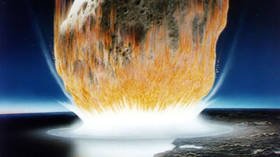Dinosaur killing asteroid caused mass extinction by turning oceans ACIDIC

The giant asteroid that is believed to have wiped out the dinosaurs had a similarly devastating effect on the Earth’s oceans, sparking a marine life mass extinction by turning the world’s waters acidic.
A team of scientists reconstructed the conditions in the oceans around the time of the asteroid strike, roughly 66 million years ago, and their breakthrough new research appears to have confirmed a long-held theory about Earth’s last great mass extinction.
Also on rt.com Humans wouldn’t exist if dinosaur-ending asteroid hadn’t struck where it didUsing rocks deposited at the time of the impact and tiny shelled fossils called foraminifera, the scientists found that the oceans became so acidic in the aftermath of the asteroid, that the marine organisms that made their shells from calcium carbonate would have been unable to survive, as their hard parts would have been completely eaten away by acid.
The study, which appears in the journal PNAS, marks the first time that evidence has been found that sulphur-rich boulders, launched far and wide by the impact, spilled vast amounts of acid rain into the world's oceans, leading to inescapable devastation on both land and sea.
Also on rt.com T-rekt: Asteroid that killed the dinosaurs hit with force of 10 billion atomic bombs“It’s a flash acidification, and it transformed ecosystems for millions of years,” explained Noah Planavsky, one of the study’s authors to the New York Times. “We were shocked that we actually found this.”
The research laid the blame for the mass extinction squarely at the feet of the asteroid as it found no evidence to support a separate theory that volcanic activity was making the oceans more acidic before the giant space rock struck.
Like this story? Share it with a friend!













